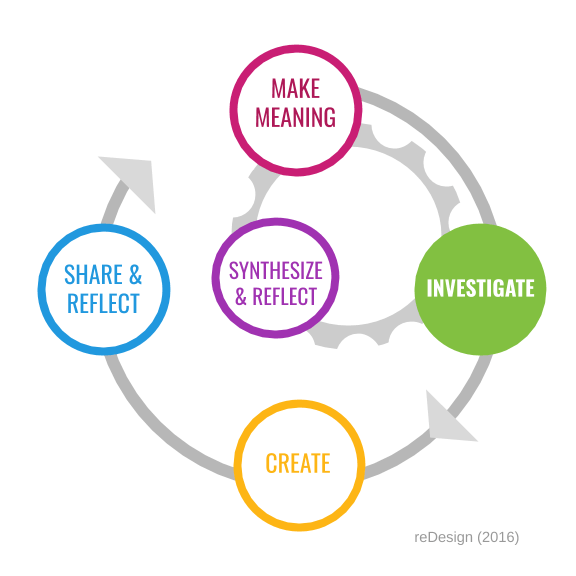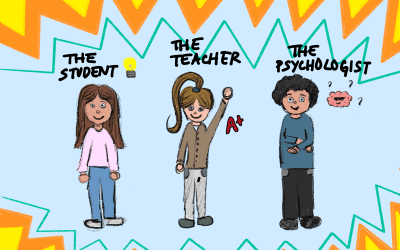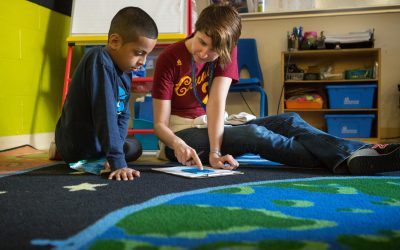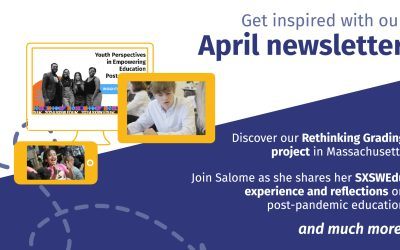
Build New Knowledge, Skills, and Perspectives through Investigation
By Jon M Altbergs and Laurie Gagnon
At reDesign, we encourage the adoption of a Learning Cycle to guide the learner through the habits and skills that support the development of competency with practice over time.
Our last blog post described how the Make Meaning phase of the learning cycle launches a lesson or unit by activating students’ prior knowledge and building background knowledge. It establishes the foundation for the learning experiences that follow, preparing students to Investigate, which is the bulk of the lesson. In the Investigate stage of the learning cycle, students apply target skills to key content as they explore and develop their own questions.

If this sounds like a lot, it is. The Investigate phase of a lesson or unit is its core; the vital work that students undertake to learn. When we wrote about Make Meaning, we emphasized that it should be as brief as necessary to move students into the investigation; that is because when they Investigate, students have the opportunity to practice and receive feedback on how they are progressing toward meeting the objective of the learning experience.
The emphasis on content and skills in the Investigation does not mean it is about drills, worksheets, or bookwork. In action, the Investigate phase is a workshop, a laboratory, a playground—a space for students to explore their questions, to experiment with new approaches, to develop new ways of thinking and doing, to tinker and to problem solve. It is a natural and important opportunity to help learners develop self awareness, identity, and perspective-taking – to practice critical consciousness – by learning to interrogate dominant narratives and uncover missing voices and histories. Higher-order thinking—application, analysis, and evaluation on Bloom’s Taxonomy—such as posing and exploring questions, using and evaluating multiple approaches to a problem, analyzing multiple perspectives, evaluating claims and evidence, and building conceptual frameworks is the work of the Investigate phase.
EXAMPLE INVESTIGATE TASKS AT THE UNIT LEVEL
| Analyze perspectives | Read closely to prepare for a Socratic Seminar, to re-imagine or experience a scene, event, or process from another point of view, or to critically analyze context for the relative power of the writer/creator |
| Study the work of experts | Examine exemplars to understand the writer’s craft, creative process, scientific method, or other approaches to problem-solving, communication, or process |
| Gather, organize, and synthesize information |
Use a mind map, conduct a card sort, or draw to organize and synthesize information to detect patterns and show relationships |
| Work with data | Conduct an experiment, design and implement a survey, or use other process for gathering or recording data; examine data to find patterns and make conjectures |
| Formulate a main idea or position | Ask questions, find evidence, and use sources to develop a stance |
By now, you’ve likely realized that each phase of the Learning Cycle is also preparation for the phase that follows. Investigate is no different—at the conclusion of this phase, students should be prepared to use their new knowledge and skills to Create the final product or demonstration that will evidence their competence. When well-designed, the Investigate phase of a unit or project equips students with the tools and the building blocks that make the Create phase a sophisticated synthesis or performance of the standards and competencies they have already practiced and demonstrated multiple times throughout the Investigate phase.
AT THE LESSON LEVEL: INVESTIGATE
As we move to the lesson level, we see how the essential practice and on-going demonstration of key skills and content knowledge is enacted on a daily basis. The Investigate phase can incorporate a wide array of learning activities, from close reading a text or participating in a discussion to carrying out a laboratory experiment or working a problem set. However, regardless of the specifics of a particular lesson, meaningful investigations draw on a set of common structures and practices that, while not unique to the Investigation phase, are essential:
- Student-led inquiry, driven by authentic questions
- Application of skills and strategies to content
- Expanded talk
- Conferencing and feedback
- Responsive supports
Inquiry is present throughout the Learning Cycle. We saw earlier how the Make Meaning phase launches inquiry by creating opportunities for students to pose their own questions. During the Investigate phase, students explore and deepen their questions, as well as pose new questions for further inquiry.
Skills and strategies modeled during the Make Meaning phase of the lesson are put into action during the Investigation. Students practice and apply the critical skills that enable them to engage with content deeply, meaningfully, and productively. Planning the lesson around the Investigation shifts the focus from content coverage—a superficial exploration of the what of learning—to process and skills—the vital how of learning—prepares students to apply strategies and skills across a variety of tasks.
Planning the lesson around the Investigation shifts the focus from content coverage to process and skills. Process and skills are the vital how of learning that prepare students to apply strategies and skills across a variety of tasks. The content remains important as a context for the learning and is no longer a superficial exploration of the what of learning.
Expanded talk allows students to share their thoughts through academic discourse, creating opportunities for students to listen carefully to others’ thinking and to provide responses showing critical engagement with the task. By removing the written word as a potential barrier for meaning-making and synthesizing new learning, student discourse opens the door to deeper student understanding and provides teachers with a powerful data stream so they can diagnose and respond to student needs in real time. Gamoran and Nystrand (1991) found that authentic discussion occurred on average less than one minute per day in a traditional classroom! To be college- and career-ready, all students must learn the skills for authentic, meaningful participation in the discussions that take place in the classroom and the workplace.
Conferences, in which students and teachers check in on progress and goals, are a powerful instructional tool. They provide teachers with information for assessment and differentiation, the opportunity to deepen relationships with students, and an insight into their own work from the perspective of the student. In addition to receiving immediate feedback, students benefit by having guided practice for metacognition and reflection. Conferences also allow students to share their thoughts and feelings about their work and their learning.
Responsive supports are based on a systematic, real-time diagnostic formative assessment process that ensures timely interventions to meet students where they are. Rather than a weekly or biweekly occurrence, formative assessment is an on-going, moment-by-moment occurrence. This stream of information allows teachers—and students—to identify specific steps to intervene and ensure students learn. Such supports can be teaching or reteaching specific skills or content, providing advance organizers, or otherwise scaffolding a learning experience to ensure equitable access to all learners.
Ready to try out these strategies for student investigation? Try out one of the elements in this chart in your next lesson.
ELEMENTS OF INVESTIGATE AT THE LESSON LEVEL
| Student-led inquiry | Students ask, share, and classify questions through activities such as Inquiry Charts, Guided Peer Questions, Elaborative Interrogation, Question Sort, and Costa’s Questioning. |
| Application of skills and strategies to content | Coding Texts, Jigsaw protocols, Math process logs, Concept Maps, and Draw-Label-Caption activities help students develop a robust toolkit for problem-solving, analyzing texts, applying learning strategies, and developing metacognitive awareness. |
| Expanded talk | Write-Pair-Share and Turn-and-Talks are good starting points for expanding academic talk, while more complex discussion protocols include activities like Fishbowl and One Question/One Comment. |
| Conferencing and Feedback | Students collaborate with peers and teachers to assess performance against standards and identify next steps for learning. |
| Responsive supports | Lessons incorporate multiple modes of representation; allow for individual, pair, and group work; incorporate scaffolds, such as transparent learning goals and advance organizers available to all students. |
If you’re interested in hands-on learning and support to help you design learning experiences that are research-based and built around the learning cycle, check out this workshop series, The Learning Cycle Workshop, which will be offered through reDesign’s Institute in 2021. We hope to see you there!



